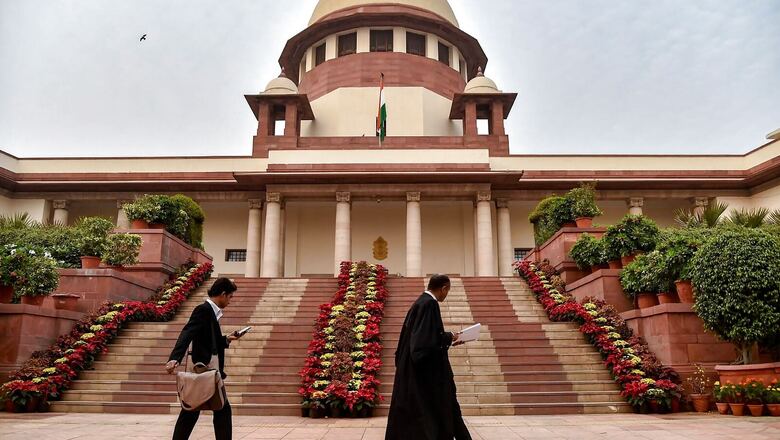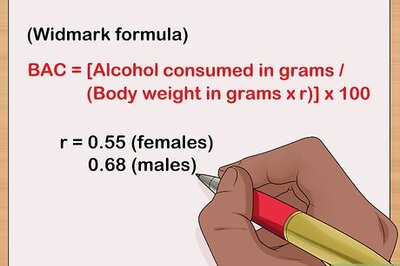
views
Three of five judges of the constitution bench in Supreme Court on Monday ruled that providing 10 per cent reservation to economically weaker sections (EWS) persons in admissions and government jobs does not violate the basic structure of the constitution and the equality code. Two other judges in the bench, however, dissented saying excluding SCs, STs, OBCs from this amendment is unconstitutional.
A five-judge Constitution bench headed by Chief Justice Uday Umesh Lalit and also comprising justices Dinesh Maheshwari, S Ravindra Bhat, Bela M Trivedi, and J B Pardiwala, delivered the verdict in the matter.
While Justices Maheshwari, Trivedi, and Pardiwala favoured the 10 percent EWS quota, Justice Bhat and CJI Lalit dissented with the others’ judgements.
Justice Dinesh Maheshwari said the bench looked at three main points viz. whether reservation is an instrument of representation of backward classes and whether economic criteria violate basic structure; whether exclusion of categories in 15(4) from EWS violate equality code; whether inclusion violates 50% criteria.
Justice Maheshwari, pronouncing his verdict first, said reservation on economic criteria does not violate basic structure. The EWS reservation does not violate the equality code; the ceiling limit of 50% is not inflexible, he said.
The judge further said the 103rd amendment is an affirmative action for EWS by the parliament and it cannot said to be an unreasonable classification.
Concurring with Justice Maheshwari, Justice Bela Trivedi said exclusions of socially economically backward classes is not discriminatory. At the end of 75 years of our independence we shall revisit the reservation system, Justice Trivedi said.
Justice Pardiwala too favoured the EWS quota. “While concurring with Justice Maheshwari and Bela Trivedi and while upholding the impugned amendment, I have thought it fit to observe ‘reservation is not an end, it is means, it should not be allowed to become a vested interest’,” he said.
Justice Bhat, however, dissented with others and said our constitution does not permit exclusion and this amendment undermines the fabric of social justice and thereby the basic structure.
“This amendment is deluding us to believe that those getting social and backward class benefit is somehow better placed. This court has held that 16(1) and (4) are facets of same equality principle.”
“The characterization of excluding the poor of SEBCs is incorrect. What is described as benefits cannot be understood as free pass, it is a compensatory mechanism to reparate,” Justice Bhat said, adding, “by excluding the poor among SC/ST/OBC from economically backward classes, the amendment practices constitutionally prohibited forms of discrimination.”
The judge said the exclusion neglects this principle and strikes the heart of the equality code.
CJI Lalit concurred with Justice Bhat, whose verdict said reservation based on economic criteria is per se not violative but excluding backward classes from SC/ST/OBC from EWS is violative of basic structure.
The apex court had on September 27 reserved the verdict on the legal question of whether the EWS quota violated the basic structure of the Constitution after hearing a battery of senior lawyers, including the then Attorney General K K Venugopal and Solicitor General Tushar Mehta, in the marathon hearing that had lasted for six-and-half-day.
Academician Mohan Gopal had opened the arguments in the case before the bench on September 13 and opposed the EWS quota amendment by terming it as “deceitful and a backdoor attempt” to destroy the concept of reservation.
Tamil Nadu, represented by senior advocate Shekhar Naphade, had also opposed the EWS quota, saying the economic criteria cannot be the basis for classification and the top court will have to revisit the Indira Sawhney (Mandal) judgement if it decides to uphold this reservation.
On the other hand, the then attorney general and the solicitor general had vehemently defended the amendment, saying the reservation provided under it was different and had been given without disturbing the 50 per cent quota meant for the socially and economically backward classes (SEBC).
Hence, the amended provision does not violate the basic structure of the Constitution, they had said.
The top court heard as many as 40 petitions and most of the pleas, including the lead one filed by ‘Janhit Abhiyan’ in 2019, challenged the validity of the Constitution Amendment (103rd) Act 2019.
The central government had filed some petitions seeking the transfer of pending cases, challenging the EWS quota law, from various high courts to the apex court for an authoritative pronouncement.
The bench, on September 8, had framed three broad issues for adjudication arising from the pleas challenging the Centre’s decision to grant 10 per cent reservation to EWS in admissions and jobs.
It had said the three issues suggested by the then attorney general for the decision “broadly” covered all the aspects relating to the petitions on the constitutional validity of the decision to grant the reservation.
“Whether the 103rd Constitution amendment Act can be said to breach the basic structure of the Constitution by permitting the State to make special provisions, including reservation, based on economic criteria,” read the first issue framed.
The second legal question was whether the constitutional amendment could be said to breach the basic structure by permitting the state to make special provisions concerning admissions to private unaided institutions.
“Whether the 103rd Constitution amendment can be said to breach the basic structure of the Constitution in excluding the SEBCs/OBCs, SCs/STs from the scope of EWS reservation,” the third issue, to be adjudicated upon by the bench, read.
The doctrine of basic structure was propounded by the top court in 1973 while deciding the Keshavananda Bharati case. It was held that Parliament could not amend every bit of the Constitution, and aspects such as rule of law, separation of powers, and judicial freedom formed part of the “basic structure” of the Constitution and hence, could not be amended.
The Centre, through the 103rd Constitutional Amendment Act, 2019, introduced the provision for Economically Weaker Sections (EWS) reservation in admissions and public services.
Earlier, the Centre, in 2019, had also told the apex court that its law, granting a 10-per cent quota for Economically Weaker Sections, was brought in to promote “social equality” by providing “equal opportunities in higher education and employment to those who have been excluded by virtue of their economic status”.
The Lok Sabha and the Rajya Sabha cleared the bill on January 8 and 9 in 2019 respectively and it was then signed by then President Ram Nath Kovind. The EWS quota is over and above the existing 50 per cent reservation to SCs, STs, and Other Backward Classes (OBCs).
Read all the Latest India News here

















Comments
0 comment